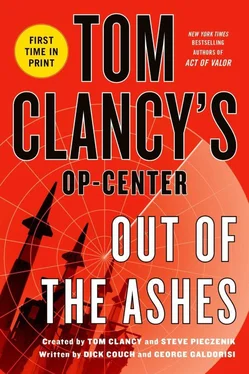“That’s good news,” Bowling replied, smiling. “My wife’s birthday is next month, and I need to do some shopping in the gold souk in Bahrain.”
* * *
Aboard the Bayandor -class corvette Naghidi, Lieutenant Qaisar Ghorbani was not smiling. His was the only Iranian warship between Iran and the American ships. He nervously paced Naghidi’s narrow bridge as he steamed his ship east and west north of Larak Island as ordered. Only two months into his first sea command, Ghorbani was still trying to figure out what he was doing, and more to the point, what he might be asked to do. His commodore, based in Bandar Abbas, had relayed Admiral Sayyari’s vague orders to “ensure the Americans respect the Islamic Republic of Iran’s territorial waters.”
Ghorbani had history with Admiral Sayyari. He had been Admiral Sayyari’s aide in early 2013 when the admiral had taken the Iranian navy’s 24th Flotilla to the Pacific and the historic naval visit to China. Ghorbani had done everything the admiral had asked, even some things, terrible things, he was now ashamed of and regretted. Now he was known as Sayyari’s golden boy, and the powerful admiral had used his considerable influence to get Ghorbani an at-sea command. A good many more qualified officers had been passed over so that Ghorbani could command the Naghidi. He had very little time at sea and had never heard a shot fired in anger. Now he was supposed to take action if an American ship strayed into waters Iran considered their own.
As he paced the bridge, he nervously fingered the script he was to use to demand that American ships leave Iranian waters. Ghorbani had read the scripted text over and over until he nearly had it memorized. He prayed to Allah that he would never have to use it.
Central Arabian Gulf
(March 26, 1330 Arabia Standard Time)
Commodore Joe Armao was again on the Ponce ’s starboard bridge wing where the ship’s captain sat in his bridge chair surveying the mine-clearing operation.
“Afternoon, Commodore. Quite a little operation you have going here. Fifth Fleet commander must be pleased. How’d the call with him go?”
“Reasonably well, thanks. There’s obviously some relief we’ve cleared the main navigation channel and ships are flowing in and out of the Gulf, but I think he expected more to have been done after three-plus days at it.”
“Well, you have to understand that he’s an aviator, and what they know about mine countermeasures would fit in a thimble.”
“You’re spot on there. He did direct us to start to go after the shallower mines up near Quesm Island, as well as in the vicinity of Ras al-Khaimah, and try to get it all done in the next two to three days.”
“Doable from your perspective?”
“It is, as long as that Iranian corvette doesn’t give us any trouble. He’s stayed on station around Larak Island for the past three days. I don’t know what his orders are other than to shadow us and report on what we’re doing. Still, having it there is annoying. You never know what these Iranians might do.”
“We’ll find out soon enough. You sending one of the Avengers up there to work?”
“Two, actually— Scout and Ardent. Mustin ’s going to escort them into shallower water and keep an eye on that corvette.”
“Good idea. I’ll just enjoy it here from the cheap seats.”
* * *
Aboard Naghidi, Lieutenant Ghorbani was no less nervous than he was when he first arrived on station, but now he was bored. Listening to the radio chatter from the American ships and aircraft as they slowly and meticulously cleared mines was like watching paint dry. What was he really doing here? Surely Naghidi was there only as a show of force. The day before he had watched the first tanker steam cautiously through the strait’s main navigation channel and now he was seeing one after another sail past. Clearly whatever Iran’s leaders wanted to accomplish with this nonsense was not working. He was brought back to the present when one of his seamen approached.
“Captain, the lookout reports the American destroyer and two smaller vessels are moving north toward us!”
“Where? How far off are they?” Ghorbani asked, grabbing his binoculars.
“There, right on the horizon,” the seaman replied, pointing in the direction of the American vessels.
“Very well. Sound battle stations. I want us ready to engage and defend ourselves as necessary. Have the communications officer meet me up here.”
“Yes, Captain,” the seaman replied.
Was what Ghorbani feared about to happen? Was he going to have to carry out his orders?
* * *
USS Mustin led the ducklings, Scout and Ardent, slowly toward Larak Island. Commander Jennifer Sullivan had already brought her ship to general quarters. Nearing the end of her thirty-month command tour, this was Sullivan’s third time in the Gulf as commanding officer of Mustin, and she knew these waters well. She also knew her mission: Don’t show any hostile intent toward the Iranian corvette, but ensure Scout, Ardent, and Mustin were not threatened. Before leaving Bahrain, the 5th Fleet lawyer and operations officer had come aboard Mustin and briefed her wardroom on Iran’s maritime claims. They were not the same as those recognized by other maritime nations. Sullivan wasn’t looking for trouble, but if she were challenged by the Iranian navy she knew what was authorized in the way of force and what wasn’t. Her ROE, rules of engagement, were clear. She just hoped the Iranian commanding officers’ were, too.
* * *
Lieutenant Ghorbani had left Naghidi ’s bridge, gone to his stateroom, and locked the door. He rolled out his prayer carpet and prayed to Allah to deliver him from what he feared was about to happen. He was not a coward, but he knew he was outgunned and outclassed by Mustin, to say nothing of the armed Seahawk helicopter she carried. Now, back on the bridge of his ship, his white uniform blouse was wet with perspiration. He was beyond fear. In his hand, he held the papers his commodore had given him. Numbly, he prepared to carry out his orders. Though they were still about five miles from Naghidi, Mustin and the other two vessels had finally entered waters Iran claimed as its own. Reluctantly, he keyed the microphone and read from his script.
“American naval vessel entering the territorial waters of the Islamic Republic of Iran, identify yourself.”
Aboard Mustin, Commander Jennifer Sullivan was ready. “Iranian naval vessel, this is USS Ship . We are conducting innocent passage through your waters and our mission is to remove hazards to navigation. We mean no harm to the Islamic Republic of Iran.”
Ghorbani froze. His communications officer, who stood next to him, pointed to the phrase on the page he was supposed to read next.
“American naval vessel, you are illegally trespassing in the territorial waters of the Islamic Republic of Iran. You will turn your vessel around and leave our waters immediately.”
Sullivan was ready with her reply. “Iranian naval vessel, this is USS Ship . We are conducting innocent passage through your waters and mean no harm to the territorial integrity of the Islamic Republic of Iran.”
Aboard Naghidi, all eyes were on Ghorbani, but he did nothing. “Captain,” his communications officer pleaded as he pointed to the piece of paper he held in front of Ghorbani. “Here is what the admiral ordered. We must fire a warning shot across the American ship’s bow.”
Читать дальше












